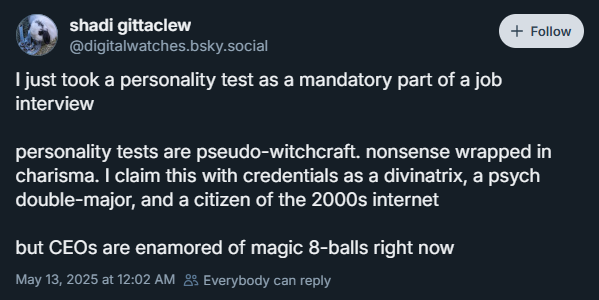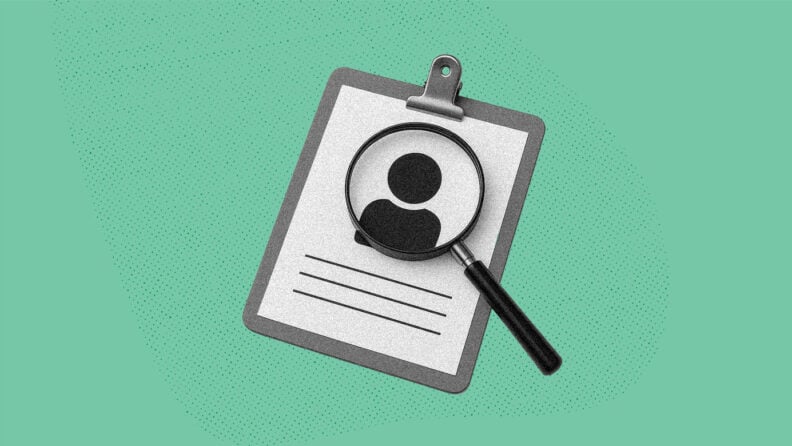So you're interested in personality tests? I have a question for you before you read anything else on this page. Are you using the right one?
That can be tough to answer, but if you're not happy with the results you've been getting, you may not be using the right assessment. With that in mind, we've created a different kind of assessment, one that looks at what you're seeking in a new hire and matches you to the assessment that best examines those traits or skills.
Answer a few questions for us (completely anonymous), and then take the quiz. Hopefully, this helps you identify the right assessment for the skills you need to hire for.
Okay, now let's dig into personality testing with some talent acquisition experts.
In recruitment circles, personality assessments have earned mixed reputations. Some dismiss them as "corporate astrology," while others consider them essential tools for building effective teams.
But as hiring processes evolve and companies focus more on culture contribution than simple skills matching, these assessments remain popular among hiring organizations. Why?
"I think they're interesting to figure out the type of personality that you're bringing on board and how you would need to think about managing that person," explains Jessica Smith, founder of Savant Recruiting and veteran recruitment professional.
Not everyone shares this enthusiasm across all contexts, however.
"It depends on the roles that people are being hired for," notes Elena Agaragimova, career coach, talent leader, and founder of Shiftwell.AI. "I think they're more useful in leadership roles, like when you're building a team that you need a specific kind of fit for. That's where it's valuable because it helps bring that self-awareness, which a lot of people lack."
Many on the other side of the coin simply think they're a method eliminating neurodivergence from hiring processes or getting rid of people the hiring team holds a bias against.

From "Culture Fit" to "Culture Add"
One of the most significant shifts in modern hiring philosophy has been the move from seeking "culture fit" to valuing "culture add."
"We always say culture fit, but it's more about culture add," Smith notes. "I really wish hiring managers would drop the whole culture fit narrative."
This paradigm shift acknowledges that building diverse teams means looking beyond candidates who mirror existing team personalities. Instead, assessments can help identify individuals who bring complementary—rather than identical—traits to an organization.
Meqa Smith, Founder and Talent Engagement Strategist of The Unforgettable Agency, reinforces this: "Compatibility with others in small teams, especially when hiring for leadership roles is key. This goes both ways, so I profile my clients first too."
Strategic Applications Beyond Selection
While personality assessments can inform hiring decisions, their value extends beyond the selection process:
- Tailored Management Approaches: Understanding a new hire's personality traits allows managers to adapt their leadership style accordingly.
- Team Composition Analysis: Some organizations use assessments to analyze successful teams and identify personality patterns that contribute to high performance.
- Onboarding Optimization: Knowledge of a new hire's work style can shape more effective onboarding experiences.
- Development Planning: Assessments provide insights that help tailor professional development to individual strengths and growth areas.
"Depending on the role, assessments can help decide between two candidates or help set up a strong working relationship with their leader," Smith explains. "The key is to understand what each different type of assessment can tell you and what it can't."
The Assessment Spectrum
Not all personality assessments are created equal—nor should they be used interchangeably. Different tools offer distinct insights. On a base level, some of the biggest, most popular ones break down something like this:
- DISC profiles focus on behavioral styles and communication preferences
- Myers-Briggs Type Indicator (MBTI) examines psychological preferences and decision-making approaches
- Enneagram explores motivational patterns and core fears
- StrengthsFinder identifies natural talents and capabilities
- Predictive Index assesses workplace behaviors and cognitive abilities
- Kolbe focuses on instinctive action modes in work scenarios
- Prism examines behavioral preferences in workplace contexts.
Agaragimova has clear preferences among these options: "Kolbe is a pretty good one. It gives you more of a skill set for how you would operate in a work role versus just personality."
Some organizations use these tools to benchmark against high performers.
"Historically they didn't have great success rates with the salespeople they were hiring," Jessica Smith recounts about one company.
Her recommendation: "Bring psychometric testing on board and rank all the people that were successful...so the people that usually have success in this role are this kind of personality."
Role-Specific Application
While assessments can provide valuable insights, their utility varies significantly across different roles and organizational levels.
Agaragimova draws a clear distinction around which roles it has value for, and it tends to be tied to seniority and technical need.
"For corporate roles, for leadership positions, I think it is helpful. I don't think it's helpful for junior roles or even mid-level roles because they don't even know themselves yet. Their skills are not developed yet," she said.
She's even more selective when it comes to technical positions.
"We've tried different things for technical staff... It just doesn't work," she said. "In tech, personality matters, yes, but I need their skills to matter more because they need to be really good at that technical skill."
This perspective highlights a crucial point: assessments may be most beneficial when targeted at specific organizational needs rather than applied universally.
The Execution is Everything
The implementation of personality assessments ultimately determines their effectiveness. Industry best practices include:
- Using assessments as conversation starters rather than definitive judgments
- Combining multiple assessment types for a more comprehensive picture
- Considering results within the broader context of skills, experience, and organizational needs
- Avoiding over-reliance on assessments at the expense of other evaluation methods
- Applying them selectively based on role and seniority level
What's Next?
If you want to keep learning about the latest practices, trends and and mistakes in talent acquisition, sign up for the People Managing People newsletter. You'll insights and tips from experts straight to your inbox.


